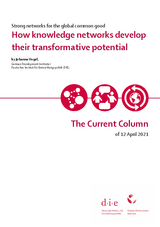Strong networks for the global common good
How knowledge networks develop their transformative potential
Vogel, JohannaThe Current Column (2021)
German Development Institute / Deutsches Institut für Entwicklungspolitik (DIE), The Current Column of 12 April 2021
One thing that the pandemic has made clearer than ever is that, when it comes to global crises, we are all in the same boat. Developing a vaccine rapidly required enormous investment, knowledge, linking of global value chains and infrastructure, and interdisciplinary and transnational teams of scientists. Likewise, challenges such as climate change, financial crises and cybercrime cannot be tackled by one country in isolation. Today’s world is connected, complex and diverse. Knowledge networks are an instrument for enabling stakeholders to work together to define problems and find solutions. To this end, these networks must be interdisciplinary and transnational in nature and view the single pieces of the world as one whole. The Managing Global Governance (MGG) Network of the German Development Institute / Deutsches Institut für Entwicklungspolitik (DIE) is one such knowledge network. It seeks to drive sustainable change processes at social, economic and environmental level. The network serves in this context as a platform on which young experts from different disciplines and countries can work on solutions for increasing the (global) common good in the long term.
How can this be achieved?
Over 10 years of experience with the MGG Network show that there are three things worth investing in: trust, a shared vision and structures that facilitate innovative activities.
Trust is the first cornerstone, without which networks cannot function. Successful knowledge networks require relationships to be maintained on an ongoing basis in order to foster and sustain trust. Trust makes it easier to collaborate and solve problems together. Decision-making processes are more efficient the greater the level of trust in network members, their skills and their reputation for successful cooperation. Trust-based collaboration strengthens creativity and innovation. Trust can be boosted in practice based on tangible concepts such as reliability, predictability, honesty, openness and personal proximity. Confidence-building measures must be a foundational element of any networking activities. In MGG events time is always allocated for personal dialogue. I can only trust my partners if I know them. Reliable, transparent and open communication is also important. A culture of ongoing feedback and reflection strengthens mutual trust.
The second cornerstone involves developing a common vision for the knowledge network in order to develop transformation. This vision consists of shared values and convictions, which provides the framework for the network’s practical activities. It is only possible to work in detail on how the network will carry out its work once it has been clearly established what it intends to achieve and why. A network vision is particularly effective if it is created on a participatory basis. Within the MGG Network a joint vision has been discussed along topics such as: What is the narrative of our network and what values define us? What is our vision for the next few years? What are our particular strengths? Where can we start our work in order to be particularly effective? This kind of process boosts the sense of community, defines a framework for future activities and describes the fundamental goal of the network. While this may seem laborious at first glance, it will benefit the network in the long term.
Third, strong networks need strong structures. For knowledge networks that seek to achieve transformation oriented to the common good, it is particularly expedient to establish structures for self-organising. Self-organising offers the advantage that the project’s development is driven by the network members, who have the intrinsic motivation of pursing their own passion. Self-organising has proven effective in large, heterogeneous networks such as the MGG Network as a way of driving diverse projects without being obstructed by central steering processes. This is facilitated through formats such as the MGG Network Days, which provide the space and support for developing one’s own projects in a creative and communal setting and, ideally, continuing them on a self-organised basis. Virtual communications platforms are also an effective means of facilitating self-organised cooperation.
In order to address global challenges effectively, quickly and flexibly, it is worth investing in strong networks. Trust-based relationships within networks facilitate rapid decision-making. Structures that facilitate self-organising give rise to innovation. A common vision enables everyone to pull in the same direction. Activities initiated by the MGG Network, such as new public-sector training formats for implementing the 2030 Agenda, show how this kind of network culture can give rise to specific changes.


